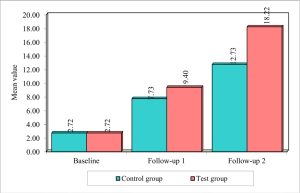
ABSTRACT
Background: India is among the highest burden of Tuberculosis (TB) cases across the world. Delaying the diagnosis and treatment adherence towards anti TB drugs were common causes observed among the TB patients. There is a need to identify the gaps and provide the awareness about the TB infection, which will help to achieve a ‘TB free India’ by 2025. Therefore, we aim to assess and evaluate the Knowledge, Attitude and Perception (KAP) among TB patients regarding the management of TB. Materials and Methods: A Randomized controlled study was conducted among TB patients. A Self-prepared and validated KAP questionnaire was developed using World Health Organization (WHO) recommendations for TB KAP studies and interviewed the patients at the baseline. In test group by using patient information leaflets and counselling were given under the clinical pharmacist whereas in control group usual care was given by other health care team. Then two follow ups were done after every three months by using same set of questionnaires in both groups. Results: A total of 250 participants were enrolled, among 220 were recruited in which majority of them belongs to 26-35 age group in both test 63 (57.27%) and control 66 (60%). In health seeking behaviour, most of them usually go to private clinic compared to government clinic or hospital. In response to TB knowledge and awareness, attitude with stigma and perception at baseline found to be low but at the end of sixth month the parameters were improved among both test and control group. The test group had shown better improved KAP than the control group. Conclusion: Majority of the participants had inadequate levels of KAP at baseline but got improved in post follow ups among both test and control groups. Test group had shown more improvement compared to control group. Thus, indicating the importance of clinical pharmacist intervention in improving the KAP among TB patients.
